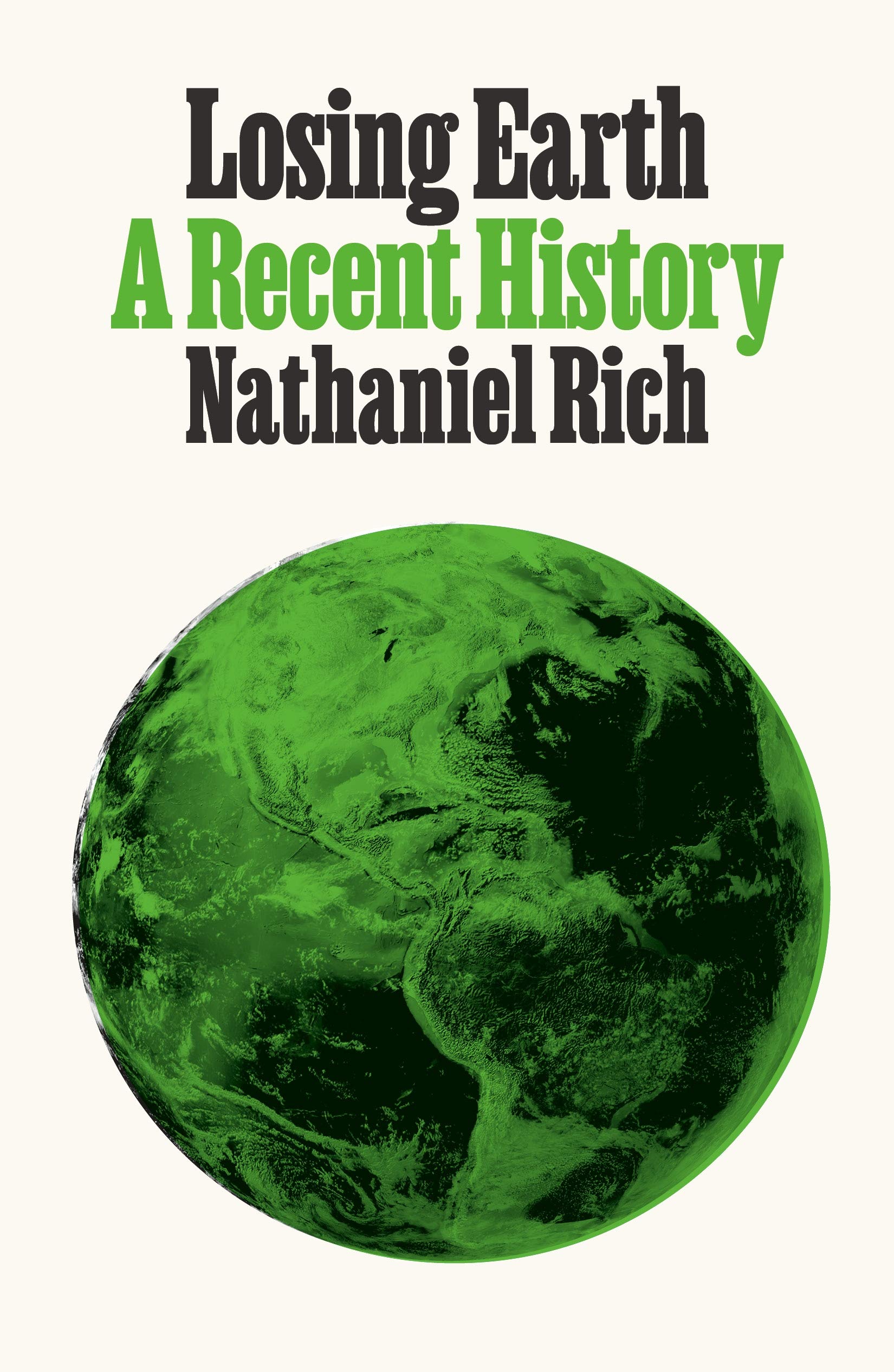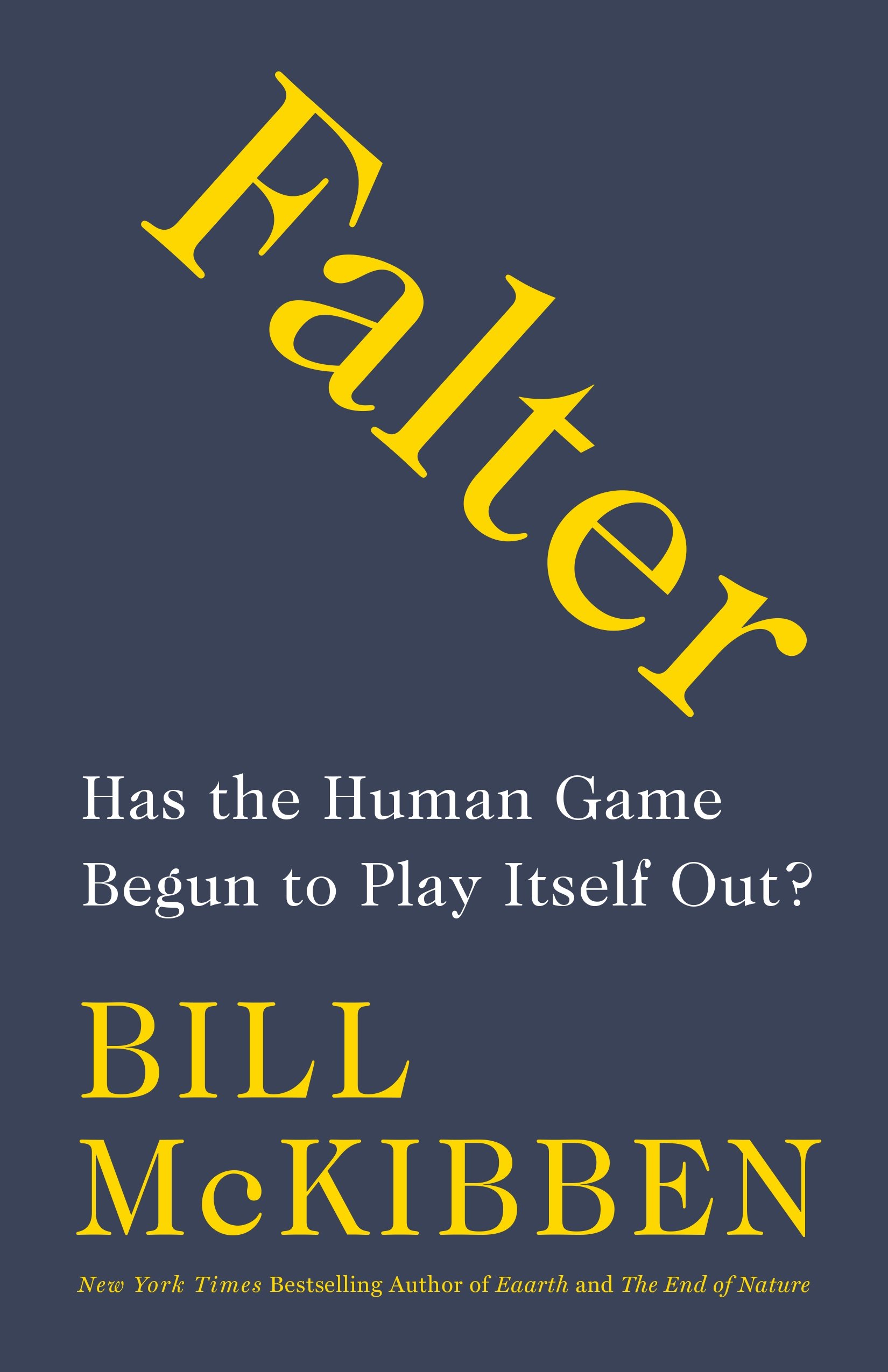As climate change continues to warm the planet, acidify our oceans, and conjure extreme weather events, two new books attempt to excavate the origins of climate denialism and certain strains of conservative ideology that, together, have thwarted aggressive action on climate change. Written by two of the leading American voices on climate, the books take different approaches to recounting this history—one through near-cinematic storytelling, and the other through urgent, activist prose that draws parallels between global warming and the dangers to humanity posed by Silicon Valley’s more chilling technological advancements.
The first is Nathaniel Rich’s Losing Earth: A Recent History, which argues that the United States came closer in the 1980s than in any decade before or since to taking aggressive action on climate change—but then didn’t. “There can be no understanding of our current and future predicament,” Rich writes in the introduction, “without an understanding of why we failed to solve this problem when we had the chance.”
A wonkish drama ensues, featuring some of the decade’s central players in climate politics: There’s Rafe Pomerance, the environmental lobbyist who helped mobilize his Washington peers around climate; James Hansen, the climate scientist whose famous 1988 testimony before Congress helped make climate change a household topic of discussion; and John Sununu, George H.W. Bush’s cunning chief of staff, who worked to undermine political action on climate at every turn. President Ronald Reagan also appears in this history, his 1980 election dealing a particular blow to Pomerance, who thereafter “found himself wondering whether what had seemed to be a beginning [of action on climate change] had actually been the end.” The drama is enriched with novelistic details as adeptly drawn as those in Rich’s 2013 novel, Odds Against Tomorrow, lending the story an almost cinematic quality.
Losing Earth is based on Rich’s 2018 New York Times Magazine article of the same name, the longest article in the magazine’s history and one that stirred significant debate. Critics complained that Rich’s story let climate change’s biggest villains—fossil fuel industry executives and members of the Republican Party—too easily off the hook.

(Photo: Pan Macmillan)
These critics have a point: Rich concludes his argument by averring that oil companies made “good-faith efforts” to understand the scope of climate change, a turn of phrase that seems to give oil companies too much moral credit. Still, this critique of Rich misses an important nuance. Rich wasn’t arguing that oil execs were ignoring the problem; the article, like the book, demonstrates that, since at least the 1970s, those execs had studied their industry’s role in bringing about the climate crisis. What they didn’t do, Rich says, was take action; the industry’s malicious misinformation campaign wouldn’t launch until the early ’90s, after which it peaked, according to a blockbuster study by InsideClimate News, in the early 2000s, just after George W. Bush took office. According to Rich, this timeline matters, because, he says, oil executives’ embrace of misinformation politicized the issue far more than their inaction did.
The book makes this distinction clearer than Rich did in his article, even though it matters little in any practical sense. After all, inaction and misinformation both led us to this same moment in history—a moment in which there are so many greenhouse gasses in the atmosphere that the planet will continue to warm even if we halted all carbon emissions on Earth today. Yet the distinction does reveal some valuable insights into human thinking. Time and again, Rich argues that inaction was largely rooted in a widespread inability to think of climate change as an immediate threat. He quotes Lester Lave, an economist at the Brookings Institute who’d studied climate change for decades: “If the world were to disappear 25 or 30 years from now, it would make no difference to economists today.”
This failure among political and industry leaders to see climate change as a problem in the present tense was exacerbated by the fact that its most damaging effects were still largely invisible to most people in the U.S. during the 1980s. Even today, Americans generally still struggle to identify climate change in the here and now. Jeff Nesbit, executive director of Climate Nexus, says as much in his vital 2018 book, This Is the Way the World Ends: How Droughts and Die-offs, Heat Waves and Hurricanes Are Converging on America. Losing Earth takes up Nesbitt’s central thesis and lends it historical weight.
Some critics of Rich’s article also carped—rightly so—that he had overlooked the contributions of women during that decade of foiled progress. Unfortunately, the book version doesn’t offer much of a corrective on this point: The most visible women in this story are the men’s wives. Anniek Hansen is allotted the most space, but her narrative purpose is relegated to shedding light on the increasingly troubled mental state of her husband. Inez Fung, a co-author of one of Hansen’s most influential papers and a recipient of the 1989 NASA Exceptional Scientific Achievement Medal, is not mentioned.
A book that offers a broader and more damning account of the political machinations that led to runaway global warming is Falter: Has the Human Game Begun to Play Itself Out? by Bill McKibben, founder of 350.org, the international organization that runs grassroots campaigns to mobilize citizens and pressure governments to limit carbon emissions. Falter explores what McKibben sees as the three biggest threats to “the human game”: climate change, advanced artificial intelligence, and germline engineering, a kind of in-utero gene manipulation procedure that could lead to the creation of “designer babies.” McKibben’s book connects the origins of these threats—as well as America’s snowballing income inequality—to the mid-20th-century ascent of Ayn Rand’s conservative ideology of hyper-individualism, which prioritizes the happiness and success of individuals over those of the collective. This ideology, McKibben argues, led at least in part to the elections of Ronald Reagan in America and Margaret Thatcher in the United Kingdom.

(Photo: Macmillan)
McKibben’s look at how those leaders’ administrations shaped the 1980s and the decades that followed is less comprehensive than Rich’s but more explicitly damning. Reagan and Thatcher’s anti-government policies, he writes, did more than decimate labor unions and welfare programs—they locked in “new forms of inequality that can’t be undone even by revolution.” The result, he says, is that corporations and other big players now exert so much leverage that ordinary people can no longer rely on historical methods of change, such as the grassroots populist and progressive movements that arose in reaction to the robber barons of the late 19th century. Our inability to use democratic means to effect ideological change, McKibben argues, has also led to runaway global warming so severe that we can’t effectively mitigate, let alone reverse it.
His condemnation for the fossil fuel industry is also more direct than Rich’s: “With their advance knowledge, companies such as Exxon would have had the early inside track on building the energy economy of the future,” he writes. Had they taken action at that time, “history, geological history, would have been very different.” McKibben does not reserve his anger only for targets on the political right: “[Obama’s] term in office coincided with the large-scale advent of fracking,” he writes. And Canada’s Justin Trudeau, a leader “far more outspoken on climate change than Obama ever was,” is presiding over “one of the two largest deposits of tar sands on earth … [and] refuses to slow its expansion.”
Not that climate change is our only existential threat, McKibben reminds us. Artificial Intelligence and gene manipulation are, according to the author, equally forbidding to humanity’s future. The sections that cover these perceived threats are thinner and less persuasive than those on climate change, but they’re fascinating nonetheless, especially because of how clearly they lay bare Silicon Valley’s Randian belief in individualism at all costs. Quoting the Fountainhead, McKibben compares the tech industry’s laissez-faire attitude toward innovation to protagonist Howard Roark’s response to his architecture professors when they ask who will let him build his unconventional designs: “That’s not the point,” he retorts. “The point is, who will stop me?”
McKibben takes a stab at answering that question in a section of the book bleakly titled, “An Outside Chance.” The way he sees it, we—and by “we” he seems sometimes to mean the developed world, and at other times everyone on Earth—have two tools at our disposal to thwart total annihilation: solar panels (and, to a lesser extent, other renewable energy sources), and what he calls the “nonviolent movement,” a nebulous array of collective actions. He admits that both tools, or “technologies,” as he calls them, are still in their infancy. But he’s hopeful that both will mature in the years to come and cites successful examples of each—namely, the widespread installation of solar panels in small villages in India, which he witnessed firsthand, and the creation of 350.org, his own grassroots climate campaign that ultimately led to the largest climate change demonstration in history.
As to whether these technologies will work in time to prevent total catastrophe, McKibben is only modestly optimistic. “We’re not winning,” he admits—in part because justice movements “almost by definition … burn bright and then burn out.” That’s why, he says, we need “structures” like labor unions and social safety nets to make “fraternity real and relatively easy.”
But how to do that? McKibben puts a lot of faith in what he calls human nature. “The human project has long been a group effort,” he reminds us, and that project is at heart antithetical to the ideological individualism that’s led to so much strife and ecological devastation. By the book’s end, his paragraphs pile up with more and more examples of why humans were meant to live and act collectively, and the effect is quite moving.
McKibben is a mighty orator on the page here, just as he was in The End of Nature (1989) and Eaarth (2010), and his call for creating more compassionate and equitable societies is inspiring, especially in light of the villainous action (and inaction) outlined in Rich’s history. Taken together, both books make clear the gravity of our past mistakes. What remains unclear is whether we’ll learn enough from them to bring about a more ethical and sustainable future.

Pacific Standard’s Ideas section is your destination for idea-driven features, voracious culture coverage, sharp opinion, and enlightening conversation. Help us shape our ongoing coverage by responding to a short reader survey.





